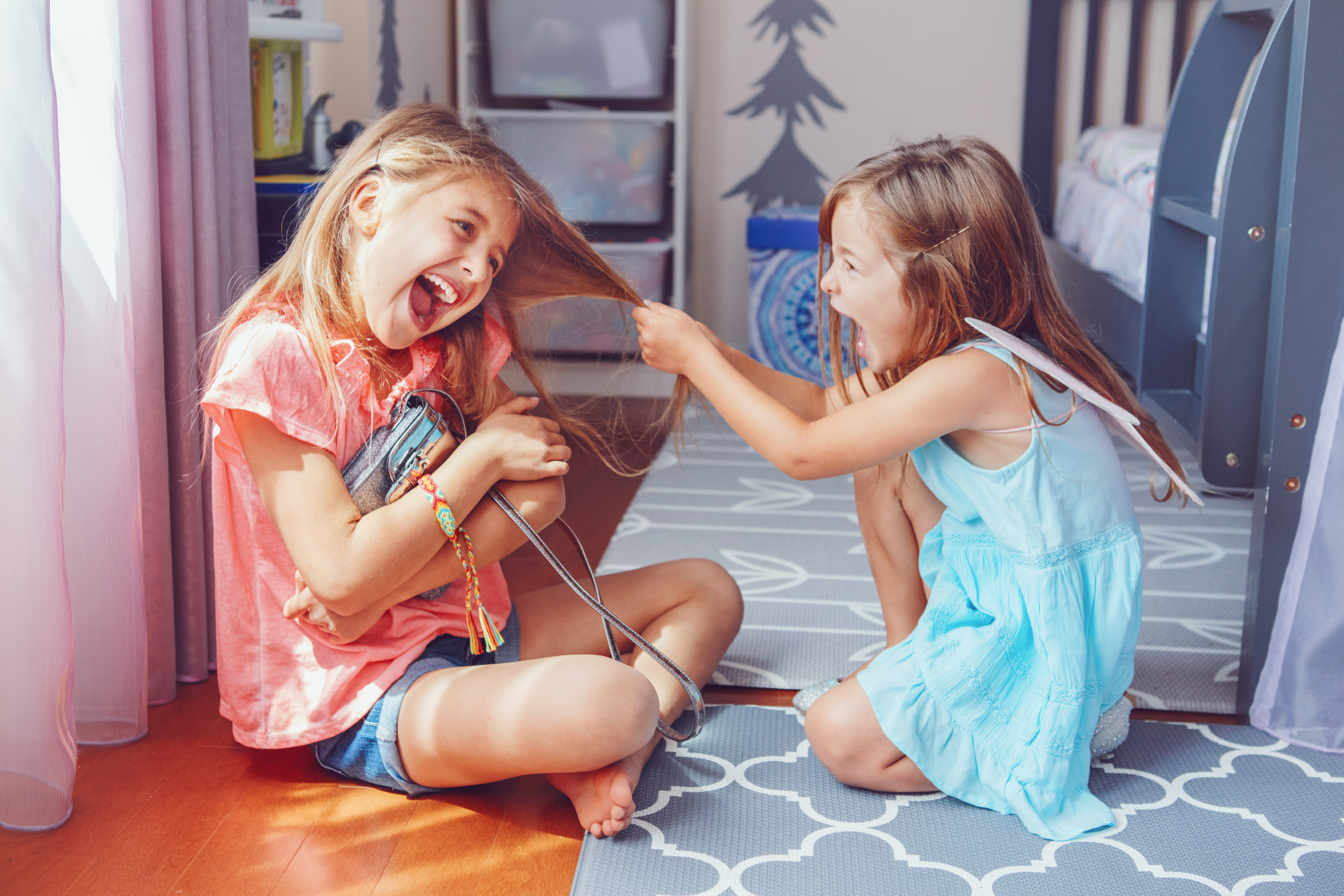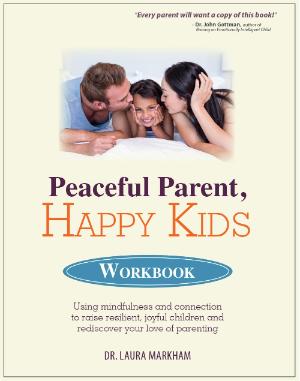
Infuriating, right? Most parents say that when one child hurts another, it’s the hardest time for them to self-regulate. In this case, it’s even worse, because Mom tried so hard to intervene, and her son still hurt his sister. Even though he knew Mom was coming, he couldn’t trust that she’d be there soon enough, and he couldn’t control his impulses. He is, after all, only four. It’s hard for a four-year-old to resist power, especially when he’s sure he’s right and his sister is wrong. (Part of being four is being sure you’re right. He’s not likely to see his sister’s side of things yet.)
Of course, the two-year-old deserves protection, which unfortunately is your job -- as if you could be in two places at once, all the time! But it's true that during those tough times of day when your son's internal resources are low, you definitely want to separate your kids. For more on prevention, please check out my book Peaceful Parent, Happy Siblings.
But the question this mom is asking isn't really about the sibling relationship. It's "how do you self-regulate when your child is hurt?"
The answer is, you don’t. When your child is hurt, you become a raging lunatic and you will do anything to protect them and destroy anyone who threatens them.
But, of course, that’s not a practical answer when the perp is also your child. It’s not even a practical answer when the perp is the next-door neighbor’s kid and you want to smash him to bits, but he’s a child too.
And that is actually the clue to how to handle this in the moment, when you’re so dysregulated you can’t see straight. If the neighbor’s child threw your daughter to the ground so she hit her head, you wouldn’t waste time screaming at him. You would fly to your child and help her. You would ignore the aggressor. Once you were calm, you would figure out how to protect your child from another incident.
Of course, this highlights our problem. With siblings, it’s pretty hard to protect your child from another incident. You can’t build a fence to keep your own child out of your yard. This increases your frustration that you can’t keep such incidents from happening, when you’ve tried so hard. So the truth is, the reason you “lose it” is that you feel powerless and the rage makes you feel better.
I hasten to add that you aren’t wrong. Any parent would feel this way. But what are your choices? You could spank your child, but research shows that would make him more aggressive, which is just what you're trying to stop[i]. You could shame and punish him, but research (and common sense) tells us that would increase the sibling rivalry and worsen the relationship.[ii] The only thing that will stop such incidents from happening is prevention, which includes helping your son with his jealousy and with his panic when you’re on the way to help but he isn’t sure you’ll get there in time.
So we’re back to that moment when you’re furious that this scenario keeps happening, and you simply have to express your authentic upset to your child. But if you tell him you’re furious at him for hurting his sister, he’s confirmed in his fear that you don’t love him—because of her! He’ll be on the defensive and won’t be able to change. If instead you can convey your fierce need to keep all your children from hurting each other—which is in fact what this is about—your child will be much more likely to respond by wanting to meet your need.
Besides, what’s really authentic here? It isn’t your rage at your son. That’s a defense against something even more primal—your anguish that you haven’t been able to protect one of your children, which is your most foundational responsibility as a parent. You need to keep your children safe.
So what if your child could hear your words as an expression of your need, rather than an attack on him? “I need all of my children to be safe. I get so upset and angry when one of my children is hurt. I get even more upset and angry when one of my children hurts the other!”
Notice that you’re clearly expressing anger. Your child has no doubt that you’re angry. But, even though your voice was passionate, you didn’t blame your child. He isn't on the defensive. He's more open to taking responsibility for what he did.
Your child may also need to cry, to work through all of those painful feelings that are driving him to hurt his sibling. For more info on why crying helps, and how to support your child to cry, see When Your Child Is Hellbent on Misbehaving: Time for a Scheduled Meltdown?
And, if one child only seems to hurt the other when she touches his things, you may need to come up with a temporary solution to keep her away from them. You wouldn’t expect a four-year-old to cross the street by himself, because he doesn’t yet have the impulse control to keep himself safe. Similarly, he doesn’t yet have the impulse control to manage himself when a competitor destroys something he has worked really hard to create -- which is how he experiences it when his sister wrecks his castle.
We're missing one more important ingredient. For your child to want to work with you on this, he’ll need to feel connected to you, and understood. So make sure that you empathize ("Sometimes it's hard to have a younger sibling") and make connecting a priority. Many parents have told me that after they worked through the Connection section in the Peaceful Parent, Happy Kids Workbook, their relationship with their child improved. It helped them realize that they needed to do some re-connecting with their child. And Connection is the best possible antidote to Sibling Rivalry.
Once your child really believes that you could't possibly love anyone more than you love him, he doesn't need to be jealous of his sibling. And there will be lots more room for love to grow.
***
Parenting peacefully is tough, no matter what! You'll find lots more scripts and tools to calm yourself and coach your children in Peaceful Parent, Happy Kids: The Workbook, from which this article was excerpted.
"Dr. Laura Markham teaches parents how to use the daily challenges of living with children as an opportunity for their own growth. The result is more mindful, peaceful parents, who are able to help their children grow into happy, responsible people. Peaceful Parent, Happy Kids: The Workbook is clear, compelling and essential for every parent." - Dr. Shefali Tsabary, NYT bestseller author of The Conscious Parent and The Awakened Family
[i]Gershoff, E.T.( 2002) Corporal punishment by parents and associated child behaviors and experiences: a meta-analytic and theoretical review. Psychol Bull. Jul; 128(4):539-79.
[ii] Brody, G. H. (1998) Sibling Relationship Quality: Its Causes and Consequences. Annual Review Psychology 49: 1-24.






